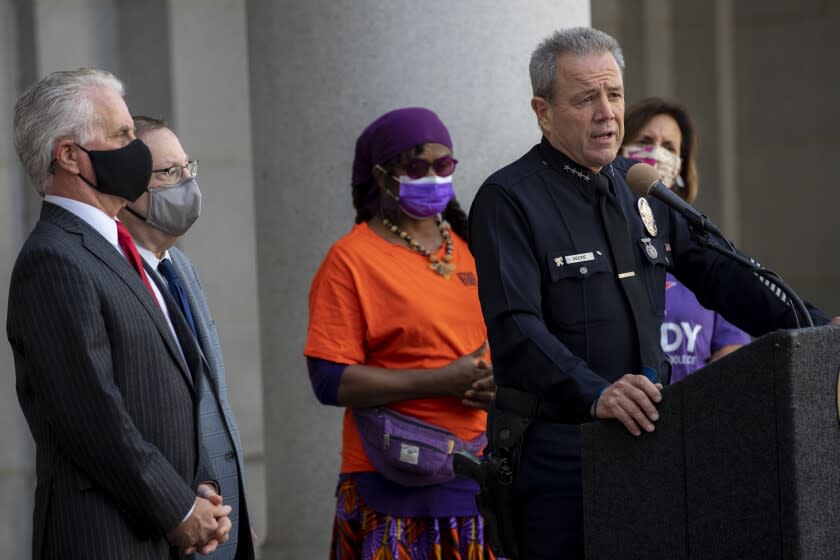L.A. City Council votes to ban 'ghost guns'

- Oops!Something went wrong.Please try again later.
- Oops!Something went wrong.Please try again later.
Untraceable, unserialized and relatively easy to assemble at home, so-called ghost guns are typically sold in kits — no background check necessary.
Police say the use of ghost guns in Los Angeles has exploded in recent years, in line with broader trends across the nation.
The number of ghost guns seized by the Los Angeles Police Department has increased by approximately 400% since 2017, with an even sharper uptick this year, according to an Oct. 19 report issued by the department.
In that same report, the LAPD described the use of ghost guns as "an epidemic not only in Los Angeles but nationwide."
The department confiscated 813 ghost guns in 2020. During the first 11 months of 2021, 1,780 ghost guns — more than double last year's total — were seized by the LAPD, Chief Michel Moore said Tuesday. Ghost guns have been used in 24 murders, eight attempted murders, 60 assaults with a deadly weapon and 20 robberies this year, Moore said.
On Tuesday, Los Angeles joined a growing list of California cities that are cracking down on ghost guns, with the City Council voting unanimously to ban the untraceable firearms.
The ordinance, which Mayor Eric Garcetti is expected to sign, bans the possession, sale, purchase, receipt or transportation of firearms without serial numbers, as well as the parts used to make them. Violators could be fined up to $1,000 and receive up to six months in jail.
Speaking at a news conference after the vote, Moore made clear that he did not think the ban would solve gun violence in Los Angeles.
"But this is a feeder system to that problem," he said. "And much like automobile safety, it is accomplished through a series of progressive steps."
Councilman Paul Koretz said that he and Councilman Paul Krekorian requested this ordinance in August "following an increase in shootings, gun-related homicides, and a surge in the number of ghost guns marketed to those who are unable to purchase firearms legally."
Ghost guns are exempt from laws requiring background checks and waiting periods because they are sold as unassembled kits, according to the motion introduced by Koretz and Krekorian.
"One of the most successful strategies this nation has adopted to reduce gun violence is background checks. ... Background checks work," Krekorian said. "And yet, we now have an entire industry of manufacturers, the sole purpose of which is to evade background checks."
California Sens. Dianne Feinstein and Alex Padilla weighed in to support the ordinance before its passage, calling it "an important effort" to help keep the weapons off the street, in a letter sent last week to Council President Nury Martinez.
“Similar initiatives have already been implemented in San Diego and San Francisco, and we commend the Los Angeles City Council for considering a similar measure," Feinstein and Padilla wrote. San Diego's and San Francisco's bans were both approved in September.
Efforts to stem the spread of ghost guns in California extend beyond local legislation.
In October, Gov. Gavin Newsom signed legislation that adds ghost guns to the list of weapons that law enforcement can seize under gun violence or domestic violence restraining orders. Newsom also signed a law in 2019 that will require the sale of components used to build ghost guns to be carried out through a licensed vendor, but that law won't go into effect until 2024.
In February, City Atty. Mike Feuer announced a city lawsuit against a major manufacturer of ghost gun parts, Polymer80.
Times staff writer Kevin Rector contributed to this report.
This story originally appeared in Los Angeles Times.

